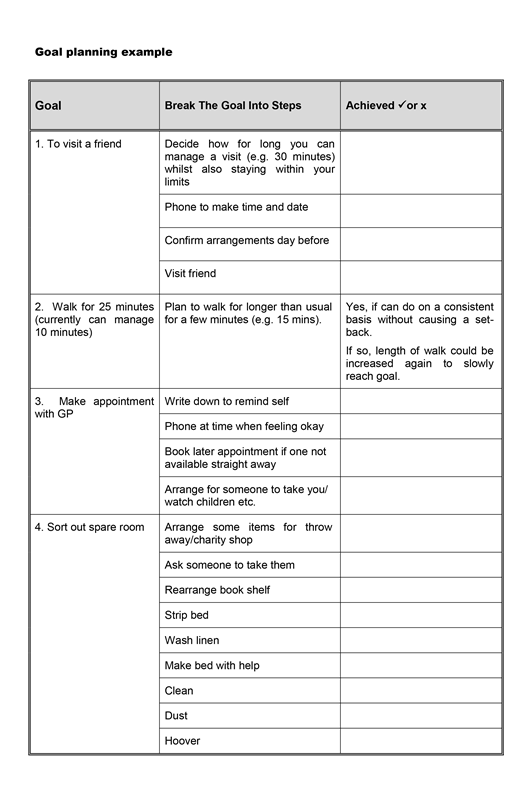Goal Planning
Why is setting goals important?
- By nature people are goal directed and tend to strive for activities that have meaning, significance and purpose for them
- Achieving small goals, perhaps by breaking up a task, can increase our self-esteem, confidence, purpose and sense of control
- Setting small goals can make tasks less overwhelming
- Once you are able to gain a more consistently achievable level of energy, goals can be useful when introducing new activities
- It is thought that if a person is able to set and work towards goals then it increases their motivation. However, if a person sets unrealistic goals then it can result in stress and tension
- Some people do not set goals due to fear or failure or not knowing how to
Tips for setting goals
It can be helpful to think about what your values are before you set goals which are meaningful for you. When formulating goals it may help to think SMART:
Specific - Have a clear idea of what you are going to do
e.g. I am going to do……, for ……amount of time, every……..days/weeks
Measurable - When thinking of your energy and if the goal can be broken down into steps.
Achievable - Do not set your standards too high – what is involved? Is it realistic?
Am I also going to do it in an energy and time efficient way?
Realistic Know yourself. Have you given yourself long enough?
What is the current ability level?
Time Limited How long will you give yourself to achieve this goal (e.g. 6 weeks?) When will you work towards it? Do not let this goal be an extra pressure, make sure it fits in with your weekly routine.
If your goal is all of the above then start working towards achieving it! It is better to have fewer goals and to achieve them rather than having many different ones at a time.
Why should goals be written down?
• Makes them concrete, i.e. it is in black and white
• Becomes both visible and obvious to you and to other people
• Helps make them more specific
• Helps commitment and motivation
• Helps break them down into smaller steps
Types of goals
ME/CFS affects different people in very different ways. We are also all unique individuals. Therefore, everyone’s goals will be different and be made in any area of life from work, health, relationships, leisure or personal development.
Some different examples might be:
• To build in 20 minutes gentle exercise once a week – broken into smaller goals to start with
• To be able to read a bedtime story for 10 minutes twice a week
• To be able to get both washed and dressed in a day
• To visit a friend once a week
• To phone a friend
• To work part-time
Tips to remember
1. Only increase your goals one at a time, and slowly over a realistic period of time
2. A long-term goal is easier to achieve if it is split up into many smaller goals
3. Re-evaluate your goals on a regular basis. You can always adjust the goal itself or the time you set yourself to achieve it
4. Do not be a slave to your goals as things do not always go according to plan. If so, do not beat yourself up about it
5. Congratulate and reward yourself for all your achievements no matter how big or small
6. Please seek our advice on setting goals if needed

